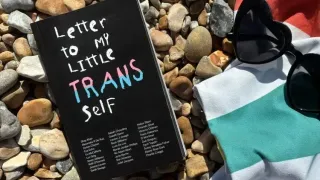December 31, 2014
New Laws to Take Effect
Kilian Melloy READ TIME: 3 MIN.
California is set to see several new LGBT-related laws take effect in 2015.
Because of bills signed into law by Governor Jerry Brown, death certificates have to reflect people's lived gender identity, and criminal defendants won't be able to use victims' sexual orientation or gender identity to help fight charges. Most of the new laws are expected to take effect January 1.
One bill Brown signed last year was Assembly Bill 1577. Known as the Respect After Death Act, the law ensures death certificates for transgender people reflect their lived identities.
The bill, authored by lesbian Assembly Speaker Toni Atkins (D-San Diego) was inspired by the death of Christopher Lee, a San Francisco artist and transgender advocate who had the wrong gender on his death certificate after his suicide in 2012.
Transgender Law Center co-sponsored AB 1577, which takes effect July 1.
Masen Davis, the nonprofit's executive director, has stated it "brings us a significant step closer to making sure that all transgender people are able to live - and die - authentically in accordance with who they really are." The LGBT lobbying group Equality California was another sponsor of the bill.
Also last year, Brown signed Assembly Bill 2501, which was authored by Assemblywoman Susan Bonilla (D-Concord) and prohibits the use of the "panic defense," where people charged with murder try to excuse their acts by claiming the victim's sexual orientation or gender identity triggered them.
EQCA co-sponsored the first-of-its-kind bill along with Attorney General Kamala Harris.
"The 'panic defense' is a homophobic and transphobic ploy that blames the victims of horrific acts of violence for the crimes committed against them," Rick Zbur, EQCA's executive director, stated in a news release not long after the legislation was signed. "It has no place in California's legal system."
Locally, the 2002 murder of transgender teen Gwen Araujo, 17, brought attention to trans panic defense tactics. Araujo reportedly engaged in anal and/or oral sex with Michael Magidson, Jose Merel, and his brother Paul Merel, who didn't participate in the killing. Magidson and Merel claimed that the discovery of Araujo's birth gender had threatened their sexualities and self-images.
Another bill Brown signed into law is AB 496, which gay Assemblyman Rich Gordon (D-Menlo Park) authored. According to Gordon's office, the law expands "existing cultural competency training requirements in continuing medical education curriculum to include a discussion of LGBT-specific issues."
Gordon also authored, and Brown signed into law, AB 1678, which encourages public utilities to enter into contracts with LGBT-owned businesses by extending the Supplier Diversity Program administered by the California Public Utilities Commission to LGBT business enterprises. Gay state Senator Mark Leno (D-San Francisco) co-sponsored the bill in the Senate.
Under the law in existence when Leno introduced AB 1678, electrical, gas, water, and other public utilities with annual revenues of more than $25 million had to implement programs encouraging business with enterprises owned by women, disabled veterans, or designated minorities. The new law adds certified LGBT-owned enterprises.
The National Gay and Lesbian Chamber of Commerce sponsored AB 1678.
LGBT couples could benefit from AB 2344. The new law, authored by termed-out gay Assemblyman Tom Ammiano (D-San Francisco), will help "reduce unnecessary legal actions involving families who use assisted reproductive technologies" such as surrogacy or in vitro fertilization, according to Ammiano's office. It primarily benefits LGBT couples who have families through assisted reproductive technologies.
Finally, Brown signed AB 966, which requires the California Department of Corrections and Rehabilitation to develop a five-year plan to distribute condoms in all state prisons. The law is aimed at decreasing HIV transmission and other sexually transmitted infections. Assemblyman Rob Bonta (D-Oakland) authored the bill.
Asked to comment about EQCA's plans for the coming year, Zbur said in an emailed statement that his group is "more energized than ever."
The nonprofit's plans for 2015 include its Fair Share for Equality program.
"We will use our legislative capacity to increase the amount of government resources that are available to help address LGBT youth homelessness, bullying in schools, and the needs of LGBT seniors," Zbur said. "A key priority for EQCA will be to assure that LGBT people are counted in our social service programs. Unless LGBT people are counted, we will not receive our fair share of government resources to address our community's needs."
EQCA will discuss the Fair Share plan and other initiatives at a town hall Thursday, January 22 at 6:30 p.m. at Most Holy Redeemer Church in the Castro. B.A.R. news editor Cynthia Laird will moderate.






